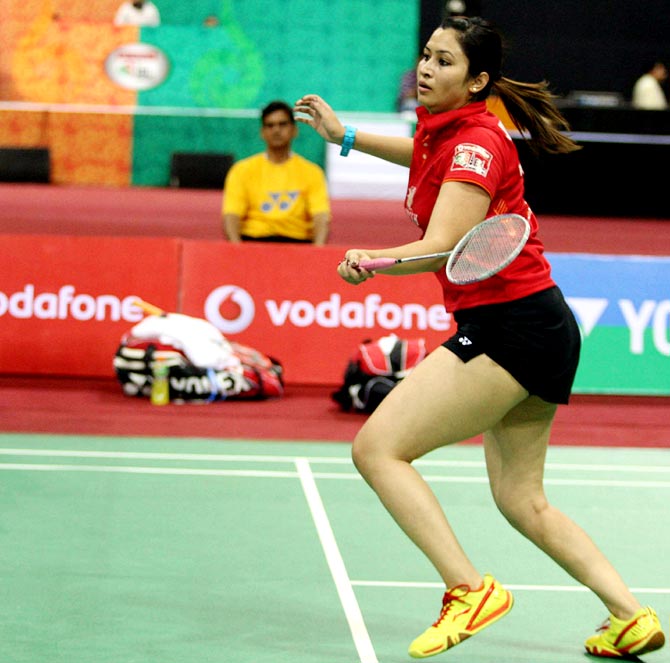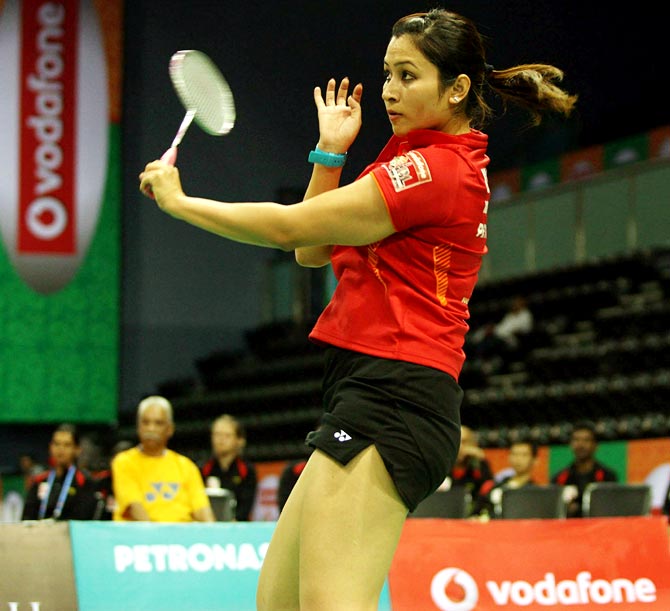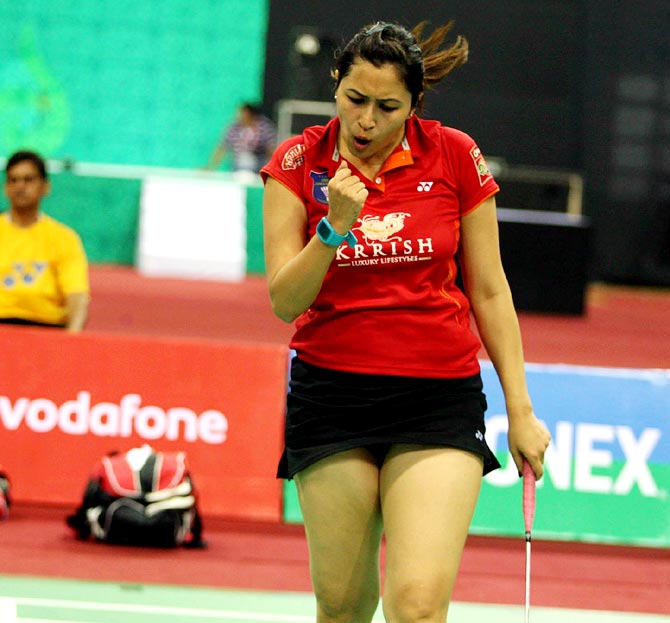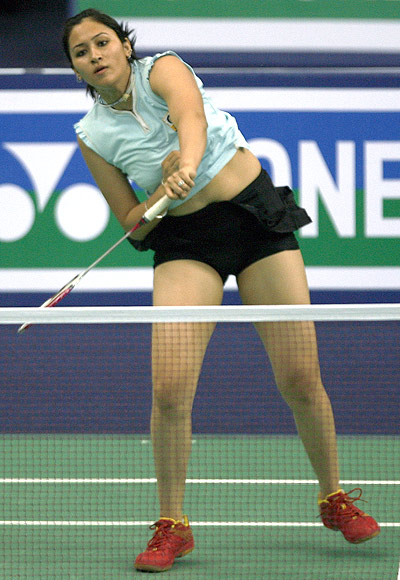Photographs: Indian Badminton League Aabhas Sharma
Jwala Gutta, India's iconic badminton doubles player, keeps getting into controversies because she refuses to keep quiet when she feels she needs to speak out
Shruti Kurien-Kanetkar enjoyed unprecedented success in badminton at the national level. From 2002-08, she, along with her doubles partner, won six consecutive national titles and they were literally unbeatable. Like most partnerships in sport, the duo too had a few rifts and rocky patches but it didn't hurt.
The pair even managed to attain a world ranking of 23. In 2009, however, things got bad and the two players split up. Her partner till then was Jwala Gutta.
"We were a great team, but there were ego issues which we just couldn’t overcome," says Kurien-Kanetkar. And it isn't surprising because Gutta has ever been known to speak her mind and be in charge of things.
That is why, Gutta has regularly found herself in controversies. "You never know which Jwala would turn up," says a team-mate of hers. "She is extremely competitive and won’t give you an inch on some days, while on other days you could see a laidback girl who loves to be in the limelight."
'Jwala used to treat Shruti like a child and that didn't go down too well'
Photographs: Indian Badminton League
During the recent Indian Badminton League, Gutta made her unhappiness loud and clear when she realised that her base price at the players’ auction was reduced by half overnight.
“I am famous for being a doubles player. I am a doubles specialist, so it was wrong to cut my base price. I feel bad, cheated and let down because I had signed a contract as an icon player with the IBL at a certain base price,” she said at that time.
Gutta may be India’s iconic doubles player, but she started off as a singles player and won the national junior championships in 2000 when she was 17. Gutta has always been a dominant player on the court, so when her coach S M Arif asked her to concentrate on the doubles, she was more than happy to. Her first partner was Kurien-Kanetkar and they were as different as chalk and cheese on court.
Kurien-Kanetkar, fast and agile, used to cover the court while Gutta dominated at the net. It was a perfect partnership, yet there were issues. “Jwala used to treat Shruti like a child and that didn’t go down too well,” says a former national-level player.
“She was always a leader during her school days and at my coaching camp,” says Arif, who Gutta refers to as a father-figure and the biggest influence on her life.
Gutta came under Arif’s tutelage when she was eight years old and the veteran coach has seen all the ups and downs in her life.
“There have been a lot of heated exchanges between us over the years but she never holds a grudge. She stands for her principles,” says the coach. She would apologise if she knew she was in wrong — but not without making her case heard.
'Jwala always speaks for everyone and takes up their cause'
Photographs: Indian Badminton League
Born to an Indian father and Chinese mother, Gutta first came into limelight when she won the U-13 national championship in Thrissur, Kerala, in 1996. Four years later she became the senior national women’s champion. She married national men’s champion Chetan Anand in 2005.
A player recalls how when national coach Pullela Gopichand asked Anand and some others to play in an international meet during national camps, Gutta expressed her husband’s displeasure through the media.
As a doubles player, she complained about singles players being favoured over them. “She always speaks for everyone and takes up their cause,” says V Diju, her mixed doubles partner. Diju recalls how at the Beijing Olympics, Gutta was the calm, focused and dedicated player he has always known.
“She was terribly disappointed at losing out in the Olympics,” he says. Diju adds that she is always encouraging him to improve aspects of his game. “She is a very good doubles player and someone who I enjoy playing with and have learnt a lot from,” he adds.
He and Gutta reached a career-high world ranking of eight in the mixed doubles in 2010.
She found a new women’s doubles partner in Ashwini Ponappa around 2009. The pair won the gold medal at the New Delhi Commonwealth Games and it looked like the beginning of a steady partnership. Ponappa was a shy, quiet and reserved person, unlike Gutta. One hardly saw her making headlines outside of the sport. Gutta was protective of her, as she is of Diju.
'Jwala's domineering nature can get to you at times'
Photographs: Krishnendu Halder/Reuters
Gutta is fairly extreme in her nature — when she showers praise it will be in abundance. When she is critical, she can be scathing. Her partnership with Ponappa came to an abrupt end in March 2013, although the two joined hands this year in August.
“Her domineering nature can get to you at times, and Ashwini perhaps felt she was being sidelined,” says a national player.
As had happened with Kurien-Kanetkar, Ponappa faced the brunt of Gutta's criticisms in public, though she also received a lot of encouragement from the mercurial player. “Shruti is one of the most talented players we have," Gutta once said about her partner.
Gutta’s personal life too has been full of controversies and ensured she hogged newspaper columns. Anand, despite being a top-15 ranked doubles player, was always in Gutta’s shadows.
“She was more high-profile, and they had a lot of problems,” says a player who knows the couple well. They were married for five years before their separation in 2011. There were rumours of Gutta’s dalliance with former Indian cricket captain Mohammed Azharuddin.
Gutta vehemently denied this, but Azharuddin was often seen at her matches and was, at the same time, vying for the post of president of the Badminton Association of India (BAI).
Jwala gets far too much attention for off-field activities
In March 2013, the shuttler agreed to do an 'item number' in a Telugu film titled Gunde Jaari Gallanthayyinde. She maintained that her focus was always badminton and had only done the song as a favour for a friend.
It was around the same time when her partnership with Ponappa crumbled. Her glamorous image caught the attention of producers, but, true to her word, she hasn’t done any role in tinseltown since.
Players don’t believe that Gutta lost her focus, but she was getting far too much attention for off-field activities.
A BAI official says that Gutta is a publicity magnet and not all publicity is good for the sport. Unlike the feisty and competitive Saina Nehwal, who lets her racket do the talking, Gutta is brazenly outspoken, he adds.
'Outspoken means a life ban?'
Photographs: Arko Datta/Reuters
Gutta came back from injury and joined IBL, where her outspoken comments before a match later led to BAI imposing a life ban on her. She has the support of the badminton fraternity, and Arif too has lambasted the authorities for treating her unfairly.
“She didn’t do anything wrong. That’s just Jwala being Jwala, standing up for what she feels is correct,” says Arif.
Gutta herself has been quoted as saying of her outburst, “What is wrong in that? Outspoken means a life ban? It is really silly. I say it how it is. I cannot mix words. I cannot lie.”
The Delhi High Court has overturned BAI’s decision and Gutta will play in the French and German Opens along with Ponappa.
Both the players took to micro-blogging site Twitter to express relief and support for each other. Gutta tweeted: “Every day I see the support u guys pour in...it just makes me so strong and so determined....thnk u guyssss”.
She is strong, feisty, outspoken and never shies from speaking her mind. At times, it works in her favour, sometimes it doesn’t. What certainly holds true for her is that, she certainly is an enigma.








Comment
article